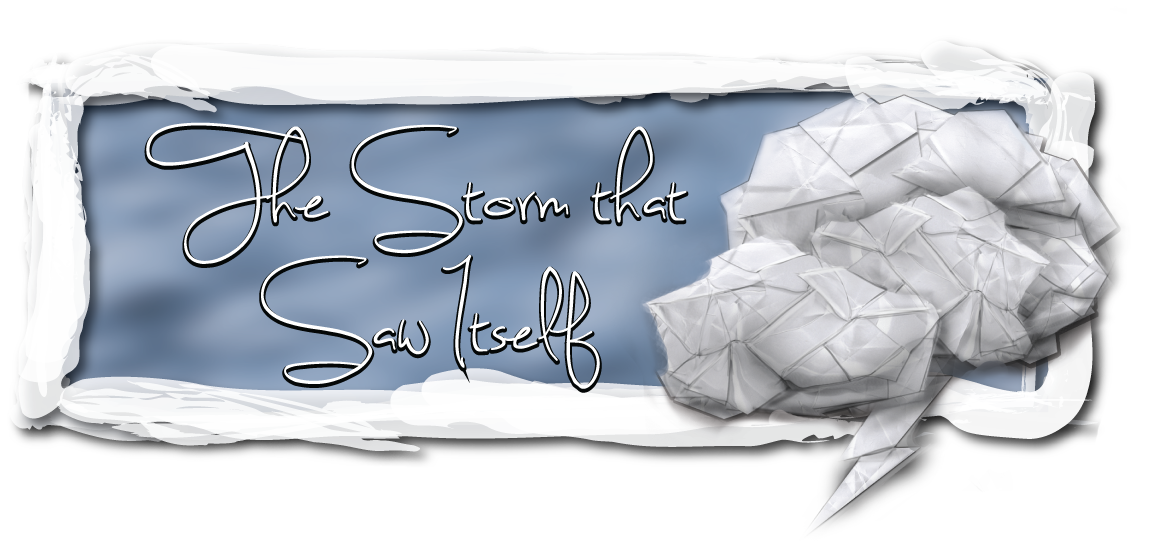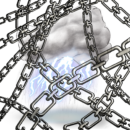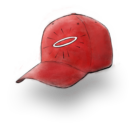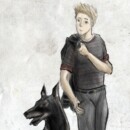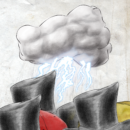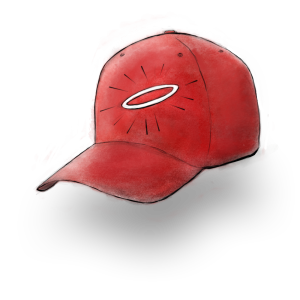– 14 –
Edmund and Andrea dance.
They dance — that time, and others; they dance until Edmund is utterly exhausted, after the patterns of a nithrid’s ways.
“What are you?” he asks.
The quad goes dark when they are at practice. The clouds roll in and deepest night occupies even what would have been the brightest day. In that thick darkness are veins of darting color, purple, yellow, and white, as the eye tracks the lightning that is the nithrid’s dance.
Edmund tries.
He really does.
It is already the fourth session, now, and he is still half-choking with exhaustion, his own saliva, and chunks of heavy air by the fifteenth minute of the dance. He can’t even hold out long enough to get a good cardiovascular workout out of the experience. He’s too lost. Too staggering. Too inept.
He spins to a halt, tripping over an old stone fountain that he’d forgotten was there, and the nithrid slams into him. She isn’t sure why. Some combination of “to remind him that there is nithrid also moving on this track,” “humor,” and “because she does not decide not to slam into him before the fait is accompli.”
“Gah,” he says.
He sprawls there in the fading dark, bloody, with a nithrid on his back. She doesn’t bother getting all the way back up. She just sits.
“This is like wrestling with the wolf,” he says, and laughs.
She stands. She walks away a little bit. “The problem you are having,” she says, “is that you are not hacking the fundamental laws of the universe with your footsteps.”
“I’m not very good at that,” Edmund admits.
He rolls over and sits up.
“I could try eating the light or something,” he says, “but I didn’t want to get all cute in the first month.”
“Eating the light.”
She stares at him, then shrugs.
“No,” she says. “Don’t do that.”
She floats a few feet to the right. Her foot comes down. Where it touches the earth smokes; dark gathers; a numinous pall clouds the air. She sights a metal pole; she arcs to it: she leaves a trail of violet behind.
She catches her breath around a spear of pain all through her chest, swallows it down long enough to say: “Like thus.” before she must rest instead of speaking.
“Please remember,” he says, “that I am not actually a nithrid.”
“I know,” she says. “But —”
She ponders.
“You look at yourself,” explains the nithrid. “And you see yourself. You see the magic in yourself. And it wasn’t magic before, of course. It was only a thing before. Before you looked at it, it was only that which had happened: marvelous and physical but not magical or intrinsically affecting at all. Only, then you look. You look, and your own sight of it weaves it into magic. You become able to do what before you only inspired to do. Thus: nithrid. Does that make sense?”
She twists, a single writhing, convoluted motion that takes her four feet into the air; makes her form appear to dissolve into caryatids intertwining, bowing towards the center, incandescent, before the frog eggs and the whisked duck and the rainbow glimmers that enchain her snap her back.
“Like so,” she says.
“I cannot see myself doing that,” Edmund admits.
He squints at her.
“Nobody sees me doing that,” he says. “You don’t even see me doing that.”
“Is that so?” she wonders, distractedly. “Hm. That may be a thing.”
She arcs to the water of the fountain. She sits beside him. She is beginning to bleed from the edges of her mouth and eyes.
“It hadn’t occurred to me,” she says, “but I suppose I don’t see you people as storms. That’s so. I’d thought that that might just be because I’m outside you? But you are rough, gross and physical by nature, and all bound up to wolf and gold.”
“I am that,” Edmund agrees.
“It would be easier,” she says, “if you were naturally electric. If you were the Easter bunny, or something like.”
“Energizer,” says Edmund, with surprising insight.
“The energizer bunny,” she corrects herself. “But — you are not hopeless. It is not that bad. There is a potential in you to be a breaker of chains. A killer. A devourer. A wielder of the lightning. It is a dim and distant potential. It is drowning in your gross mortal fleshiness and the constriction of your pet wolf’s fetters but in you I see something golden, conductive. It is buried but it is there. So see it yourself, Edmund Junior. See it harder. Empower it with your eyes.”
“I can’t see it,” he says softly. “It’s your perception.”
She hesitates.
Then she waves a hand dismissively. “Just look harder,” she says. “It’s there.”
“Maybe,” says Edmund, “I wasn’t meant to — I mean, maybe I’m supposed to look at the magic that’s actually in me, and not . . . like, your nithrid-style stuff.”
She looks at him blankly.
“I mean,” he says. “Maybe I’m not supposed to be hacking the world with my feet. Wolves are supposed to pad quietly and not with great crescendos of thunder. We’re not like, you know, cats or —”
Edmund remembers that most cats do not clank.
“I mean, like kettles, or the like.”
“I am not your father,” she says, “or your faculty advisor. Please feel free to try this, if you like.”
“Right, then,” he says.
He concentrates. People walking by think about bothering him, but don’t. He looks inwards. He faces himself, as in a mirror. He tries to recognize the magic in him: the wolf; the storm. After a while he shrugs.
“I have nothing.”
“It is all right,” she says. “Two human eyes are clouded.”
“No. I mean, inside me,” says Edmund. He holds out his hand. He closes it on air, twists it, snaps it open and closed a few times as if grasping at something that he cannot feel. “Inside me, there is a yawning white nothing. I think it is the wolf. I think it is the thing that calls the wolf, the thing that frees the wolf, the white hunger that is in the wolf. It is a devour-some emptiness. It eats the eyes of the mind I use to look at it with.”
“Huh,” she says.
“You’re bleeding,” he says. He tilts his head. He looks at her.
“Please,” she says, waving it off, “finish your discussion. I have now become interested in this nothing.”
“But you’re bleeding.”
“I pushed too hard,” she says.
He squints.
“The cage of my bones is lined with knives,” she says. She touches her cheekbones. She touches her breastbone, then runs her hand down in front of her chest to indicate the ribs. “If I am too vast, too fierce, too quick, then they will cut me when I breathe.”
His face twitches.
“It is of no account,” she says. “I am a nithrid, that has been caught by Hans. I would rather focus my attention on whether you have actually seen something worth seeing, and therefore worth stirring into a storm with your inner eyes.”
He isn’t listening.
She waves a hand in front of his face. He isn’t looking.
She says something. He does not hear it. She says other things. He does not hear them. She shakes his shoulder. She pushes him. She becomes angry. She pushes harder but he does not feel it. He does not react.
He pours it all down, down, down, into the box around his heart instead, until the world is humming, empty, barely present around him; and even still he must fight back the pain.
It’s not about her. He wishes it were just about her. He doesn’t even really like her.
It’s not about her.
What is hurting him now is the same gnawing emptiness he’d mentioned, only seen from the other side. It is the same knowledge that gripped Linus Evans, once, when he felt Hans’ death and knew the cleaning man would rise; the same that gripped poor Betty’s mother when she saw the turtle-people come.
He is hurting because he has acquired a fuzzy, awful awareness of the sea of hurt and wrongness that is suffusing the mortal world.
Finally he lets himself hear her.
He says, “I’m sorry. I can’t help you. I can’t help anybody.”
“. . . I was not asking for your assistance,” she tells him. “I was teaching you. . . .”
She stares at him blankly.
He is distant. He is mahogany, balsa wood, and teak. He will accept it.
“Of course you didn’t,” he says.
He gets up.
He can feel it, behind him. She is breathing. With each breath she is cut. He can feel it, inside him. The wolf is hurting. The fetter cuts into it. And somewhere in the world Linus Evans, who was his friend, is still alone, and suffering, and the antichrist; and Tom, he thinks, must be off in some hospital somewhere recovering from being ophidian; and Jane and Mouser doubtless wandering the streets eating out of the trash bins; and everything is wrong, wrong, wrong, and awful, and there is no brightness in it; it is rising like a storm of pain and horror in him, and he bumps into someone, barely even manages to make himself look up and apologize, o how wayward I have become —
“Linus?” he says.
“Bro!” says Linus.
“Oh my G— my— my— oh my sweet, euphemistical goodness,” says Edmund, dropping the rage and pain from him like a backpack that he’s just shrugged off. “Linus?”
He hugs Linus. He pounds his back. “How the hell have you been?”
– 15 –
Peter stops by Andrea’s room. He knocks. He waits. After a while she comes down the hall.
“I’m not in there,” she tells him.
Gamely, he tries, “Are you certain? We could check.”
“That is —”
She hesitates. She looks at him. “That is attempting to be clever, to one who has known the greatest of dwarf-smiths.”
“Well, yes,” says Peter.
She opens the door. She goes in. She nods sideways and he follows.
“Why,” she says, flatly, looking around and spotting herself, “so I am.”
Technically he could get in trouble for being in her room but the penalties for being wayward at the Lethal Magnet School for Wayward Youth are markedly lax.
She turns her attention from her own presence to his. “Did you need something, Peter?”
“There’s a dance,” he says, bluntly.
“I’m aware,” she says.
He goes a little still. “Are you?”
“It’s my nature,” she says.
“I don’t understand,” he says.
“As a dance student,” she says. “It is my nature to be aware of the fact that there are dances. I see the flyers on the wall; I think: aha! And I file the information in my mind.”
“I thought it might be that other thing,” he says.
She doesn’t bother lying about it, nor does she confess. She just looks at him with her pupils slit like a cat’s.
“I was just thinking,” he says, bluffly, moving on, and rubbing the back of his head, “that since you’re an alien freak and all, that you might not have anybody to dance with.”
“With,” she says.
“Yes,” he says. “Like, I mean, a boy.”
She stares at him in complete bafflement.
“You know.” He puts one hand in the air, and the other hand lower in the air, and mimes turning. He cannot quite manage a quarter-rotation before embarrassment stops him from proceeding further. “Like that.”
She scratches above one ear. “How extraordinary,” she says. “I had assumed that my teacher was merely joking.”
“You’re making fun of me,” Peter says. “I won’t have it. I’m a human, you know, not like . . .”
He trails off, because he can tell from her reaction that she wasn’t making fun of him.
“You really . . .” He laughs a little. “You really . . . no way.”
She blushes. She looks off. “It’s not funny,” she says.
“Dang right it’s not,” he says. “That’s awful, is what it is.”
“What?”
He sprawls on her bed. She almost objects, because he hasn’t taken his shoes off, but then she ignores it. “You freaks are all so lonely,” he says.
“There’s more of us? Of me, I mean? Of . . . I don’t know what grammatical case to use,” she says.
“I knew the Devil when I was a kid,” says Peter. “Had to punch him in the nose to get him to go away. I always felt bad about that, after.”
“What?”
“I thought, maybe he comes around, temptin’ everybody like that, because he doesn’t have any other way to talk to people. But now I’m sure.”
He sits up.
“There’s a wolf-boy,” Peter says, “too. Guy couldn’t be any stiffer if you shoved a triad of trissors up his butt. Er, if you’ll pardon my saying so.”
“Edmund,” says the nithrid. “He is not like me.”
“Could have fooled me,” says Peter.
“He is useless,” says Andrea, bitterly. “I am trying to teach him transcendence, but how can I? There is nothing to transcend.”
Peter swings around. He sits up. He looks at her.
“Him?” he says. “Oh, you shouldn’t.”
“What?”
“He’s too tight-wound already,” says Peter. “You push him and you’ll split him in half.”
“He’s not splitting,” says the nithrid. “He’s just . . . lumping there.”
“Look,” says Peter. “Kid thinks he’s a milksop who ought to grow harder. But he’s not. He’s a born rotter, that one, trying to hang on to the gentle way. You give him too much rope, he’ll just tie it to a tree and hang himself. Stands to reason.”
Her eyes search his face. “You’re joking,” she says.
“No,” he says.
“I need him,” she says. The chains through her hurt her as she breathes. Her ghost-duck glowers. “He will burst my chains. I will go out, alive and free and blasting about the world. I will shatter its cities. I will fill them up with the anima of God. They will look at me, and him, and we shall storm and marvel; we shall fill them with wonder at our glory; we will light the souls of the survivors and make them great.”
“Yeah, yeah,” he says. “Kill, destroy, get admiring looks, oh how marvelous! Whatever. If you just do — whatever — then you won’t be alone, right?”
“What?”
“You all think that,” he says. “If you just — break your chains. Kill people. Tempt people. Eat people. Wolf stuff. Devil stuff. Whatever. If you just do that, then everybody will love you. That’s how the Devil thought, too, you know. That it wasn’t him, or me, that stood between us. That it was God, or mebbe Hans. That it’s all that easy, you just do what you want and everybody will love you and it won’t actually be bad.”
“Stop it,” she says.
“You know,” says Peter. “You people don’t have a right to be on our world. Doing what you like, spreading fear and devastation — you’re just —”
“Stop it.”
He stops.
He looks down at his hands for a while. She paces back and forth. Then he looks up.
“So,” he says, “I was wondering, if you wanted to dance. With me. At the dance. But obviously I was —”
“Fine!” she says.
“Huh?”
“Fine,” she says. “Get out. I’ll dance with you. Go!”
“You don’t have to,” he says, as he backs out of the room. “I’ve just served you two big steaming platefuls of truth, you can —”
“Get out!” she yells, and throws a shoe at his back and it dissolves into lightning as it touches him and he convulses and the back of his uniform smokes and he falls painfully against the wall as she slams the door behind him.
A few other doors are open now. A few girls are peering out and looking at him.
“And then there’s that hat guy,” Peter says vaguely. “I bet that hat’s one of them, too. I bet that the hat needs people.”
He gives the floor monitor an awkward shrug and he walks away.
– 16 –
“I,” Linus explains proudly, “am now a student at the Lethal Magnet Academy for Wayward Youth.”
“You? Wayward?”
“I know,” says Linus. He brushes imaginary crumbs off of his waistcoat. “But the truth is, I need an education.”
“Can’t you just,” and Edmund makes a vaguely magical gesture.
“Watch,” Linus says.
Linus’ black dog appears. It pants. It attempts to instruct them in geometry. It fails.
Edmund blinks and it’s gone again.
“I see,” Edmund says, because he does.
“Ever since Tom,” says Linus. He hesitates. Then he smiles a little. “Well, it struck me. I mean, what if someone cleans the Devil out of me someday? Don’t I need to be ready for an ordinary life? What if I wind up wanting — you know — kids, marriage, a career, all that stuff?”
“Dang,” says Edmund. “Being shuffled through an endless series of foster homes has done you some serious good, man.”
“Ha ha,” laughs Linus.
It should be embarrassed laughter. Edmund clearly thinks that Linus has been doing something normal and proper and civilized, like shuffling through a series of increasingly baroque and terrifying foster homes, when in fact he’s been living in a bloody box —
But it’s not embarrassed laughter. It should be, but it isn’t. Edmund’s here. He’s found Edmund.
The laugh’s just joy.
“Let’s go get a drink,” Edmund says.
“Pardon?”
“There’s a bar!” Edmund says. “They’re not allowed to serve us, but we’re totally allowed to steal drinks. I mean, ‘allowed.’”
“Edmund,” says Linus in a tone of pleased shock.
“Or coffee?”
Edmund spots Peter across the way. He waves vigorously. “Oi! Peter!”
Peter squints at them. He comes over.
He stares rudely at Linus.
“This is my mate Linus,” says Edmund. He beams. “Him and me, we used to hang all the fucking time. Fought Venusians and stuff.”
“Oh,” says Peter, in sudden fury, “so that’s how it is, is it?”
“What?” says Linus.
Linus draws back a bit from Peter’s glare. He blushes.
“Just, spit, spot, off and he’s making some other kid the antichrist? Is that all I was to him?”
“What?”
Linus Evans, it must be admitted, was the Devil’s second choice.
“Listen,” says Peter. He juts his chin. “You can just tell him that I don’t care. I didn’t want the job. That’s why I punched him! I am only in this to smoosh scissors.”
“Tell who?” Linus says, bewildered.
“Oh, yeah,” Edmund remembers. “Peter knows the Devil too.”
“Bloody bastard thinks I care,” says Peter. “Well, I don’t care! He can run around doing his Devil stuff with whomever he wants! I’m a good, church-fearing Christian. Going. Church-going. Dang it. Fudge.”
He snorts, turns his head away from Linus, and he stomps off.
“I guess,” says Linus, scratching his ear, “that he doesn’t care about the Devil.”
“Come on,” Edmund says.
There are ornamental statuary angels scattered through the Lethal Magnet School’s grounds. They are much like ordinary statuary angels but they are branded Lethal and have this look in their eyes like if there were any wolves there, they’d want to kill them.
Peter is kicking one of them, hard, over and over again, in the leg.
– 17 –
For a while Linus’ presence makes Edmund happy; but that happiness frays from him over time.
Each time Edmund sees the nithrid he is reminded of the blood.
Each time he sees — practically anybody that isn’t Linus — he’s reminded of the fact that eating people is considered contrary to the cornerstone principles of decorum, even at the Lethal Magnet School for Wayward Youth. And yet he’d like to. He really . . . kind of . . . would.
Each time he goes to bed, in his furless bed, in his bed that does not breathe, that is not warm, or, well, not warmer than a normal bed, at any rate, he is reminded that he is alone and far from his wolf, for all that the wolf is in his blood, is in his bones, is something that trickles through him every moment when he breathes.
He can’t take it any longer.
He begins to brood. He begins to listen to Linus’ poetry and it speaks to him. He begins to wander aimlessly through the foggy nights.
He goes to that promontory of the hat cemetery that curls through Brentwood to the edge of the Lethal Magnet School and he climbs up and he throws down his hat as an offering, stomps it thrice, and lopes up to sit on a high peak of dead, abandoned hats and sulk.
Much to his surprise, he is not alone.
“Oh,” says Tom.
He looks Edmund up and down. He tilts his head to one side.
“Why do dwarves have to tie up everything good and marvelous in chains that hurt them?” Edmund says.
“It is a mystery,” agrees Tom.
He looks up at the sky. His eyes glint with dream-light. One day some child on a distant world will look back down at their sky; will catch a glimpse of Thomas’ dream-wroth; and its alien heart will move.
That is countless millennia from now.
That is not today.
“I’d say,” says Tom, “that when we encounter an alien purpose, a thing that moves but not in the way that we expect it to move, that has a dream that is its dream and not our dream, that it is natural to want to tame it to our own ideas. To simplify it, to bind it down into that which aligns with ourselves, and that which is our enemy, so that there is no expression of its being that is not in those terms that are our own.”
“That isn’t an answer,” says Edmund.
“Hm,” says Tom.
He takes down his hat. He holds it in his hands. He plays with the rim of it. “Sometimes I think I am my own worst enemy,” he says.
“Yeah,” says Edmund. He looks at his hands. Sometimes he wants to bite his fingers off, gently, chew them, swallow them, feel the warmth of Edmund in his gut. Sometimes he wants to bite off his own head. He gets so hungry.
Then he does a double-take, because the hat’s come off.
“Tom?”
“Huh?” says Tom. He waves a hand vaguely. “Yes. That is my name. Thomas the First, if you like, or Tom Friedman. I am the head boy of the House of Dreams —”
“Dude,” says Edmund.
“And if you are torn,” says Tom. “If you are at war within yourself, or unfocused; if you are given to two destinies, or to no destiny at all —”
It percolates, like svart-drink flowing through the ill-named and ill-omened coffee-makers of the House of Dreams. He realizes.
“Edmund?”
He is crying. Why is he crying? He can’t imagine it. He’s Thomas I, of the House of Dreams. He is basically a god. Also, a science adventurer. But he can’t help it. He is laughing and he is crying.
“Linus is here too, man,” says Edmund. “Oh, God. This is so awesome.”
“Linus?” says Tom. “Linus? I looked, man. I thought the Devil’d taken him.”
“He was being shuffled through a series of increasingly baroque and terrifying foster homes, as is traditional in our beloved, post-cisorian twenty-first century England, Tom! But now, he’s here!”
“How is he?”
“He’s great,” says Edmund. “He’s great. He is sneaking into a nunnery even as we speak.”
Tom squints at him.
“Fine,” says Edmund, “it’s a school trip to Leominster. But it totally counts.”
Tom laughs.
After a while, he wipes his eyes. He blows his nose. He smiles.
“Wow,” he says.
He flops down on the hill. He leans back. He looks up at the stars.
“Wow,” Edmund agrees. “You’d think there’d be some kind of spiritual radiation that’d keep him out, but apparently that’s only if he forgets to bring his chicken blood.”
“Ah,” sighs Tom, reminiscing.
After a while he says, “I was going to offer you my hat. Why was I going to offer you my hat?”
“I — don’t know?” says Edmund.
“There were dwarves,” says Tom.
“What?”
“You were saying something about dwarves and rot. Only, I wasn’t paying the least bit of attention.”
“We were conversing!”
Tom smiles apologetically. “That’s my marvelous auto-conversation ability,” he says. “I was totally thinking about dead mice.”
“Ha,” says Edmund.
He leans back too. He sketches in the sky with a finger. It doesn’t take, although maybe — after all his lessons — there’s a little tiny bit of violet light that follows it. Maybe. It’s ambiguous.
“Do you always give your hat to people when you start thinking about mice?” he says.
“Only you, Ed. Only you. Seriously, what’s up?”
“There’s a girl,” Edmund says.
“O ho,” says Tom. “You sly dog.”
“What? No!”
Tom giggles.
“Sorry,” he says. “I have just always wanted to call you a sly dog.”
Edmund cracks up. Then he tells Tom, “That is by no means funny, you know.”
“I know.”
“I have a wolf bound through me and in me,” says Edmund. “I want to eat you. I mean, right now. I mean, the kind of eating that leaves you dead.”
“Sup dog,” Tom offers.
Edmund winces.
“Tom,” he says. “Seriously.”
Tom sticks his tongue out. “You cannot eat me, Edmund. I am a science adventurer. I would just subdue you — with science! Besides, your girl is unlikely to approve. She would look at you and the slaver and the bits of Tom you have on your mouth and say, ‘Eek! You cannibal! This relationship is over!’ I trust you to avoid such eventualities as that.”
“Bah,” says Edmund. “I’ll just tell her I was saving the world from ophidian planet-inheritors.”
Tom’s smile flickers. It goes out. Then it comes back on a bit.
“Perhaps,” he says.
“She isn’t really a girlfriend, anyway,” says Edmund. “She isn’t into that kind of thing. She’s more of a —”
He waves his hand around.
“Candidate Doom Team member, if you know what I mean.”
“Oh.”
“I do want to free them,” says Edmund. “I want to let them go.”
He’s sitting up now. He’s grinding his fingers in the hats. He’s trying to find something, some way, to let his emotions out, but there’s nothing, he can’t, there isn’t, all he can do is vigorously massage dead hats.
“They’re so hurt,” Edmund says.
“If you want,” says Tom, “I can give you something —”
“Yeah?”
Tom has stopped. He is silent for a while. “Pardon. I am just wondering if my marvelous auto-conversation ability has led me out onto a conversational branch which, now that I am paying attention to it, I should retreat from. This is a transparently bad idea. But —”
“But?”
Tom smiles. “But it is through exhaustive implementation of our bad ideas that we discover at last the good ones. If you want to let ‘them’ go. If you want to become something that can let them go. Wolves that eat the world. Whatever? I can help you.”
“Really,” says Edmund flatly.
“I can’t predict what’ll happen,” says Tom. “Maybe that’s not even really who you are, you know? Maybe deep down you’re not a wolf-boy but a proper science adventurer. Or even some kind of holy saint! But —”
He shakes his head, vigorously.
“No matter. I can give you purpose, Ed. And I can make you more.”
“You can help me,” says Edmund. He licks his lips. He looks at Tom and his eyes catch the light of the drifting moon. “You can help me free Fenris?”
“Aren’t you supposed to do that anyway?”
Edmund’s voice has gone to begging: “Can you help me?”
In his head is the memory of the nithrid breathing, and the blood dripping from her mouth, and his conception of the spikes; and Fenris’ horrid wounds —
“Yeah,” says Tom.
Tom tosses him the hat.
Edmund looks it over. He turns it upside down and right-side up. Then, with a shrug, he puts it on.
He flails backwards.
Edmund seizes there magnificently upon that hill of hats; he flutters like a kite in a gale-wind. He tries to tear the hat from his head; he screams; his eyes roll back and his hands twitch and his fingernails sharpen and grow long.
It is pounding through him. He cannot think.
His mind keeps glancing off of the walls of the hat’s structure in him like a dazed man staggering into walls of polished marble, granite, slate. They are slick, the eyes of his mind are confounded, he cannot focus on the things that obstruct his thoughts because no sooner does he see them than his attention chases its own reflection in great slick streams into his hidden thoughts. His mind bruises itself from within; flails; he tastes bird’s spit, four simian arms, and what he can only imagine to be the torment of the willing, the clanking footfalls of some cat, the bearing witness to the wrongness, and the perseverance of hope.
Hope tastes, in case you’ve ever wondered, like a hat.
Lacerations spread around Edmund’s four limbs. He is cut, he is scarred, he is ripped and mended in a moment. Chalk-white flecks, pale veining, and bits of silver spread from the whites of his eyes into the iris and the black.
The white wolf-gold that is wound through him and around him is pulled shockingly straight and tight against his soul; it is snapped out from both directions like a cord pulled suddenly into a knot; his own soul frays. The hunger in him explodes; it alloys with him, within him, and through him, until there is no part of him that is not whole and sound and rife with the hunger’s rancid touch.
He is made starved in a world of chains.
The kether-hat floats from his head and he scrambles in the graveyard until he finds a hat of pale white to match his soul.
He rests there, for a moment, on his hands and knees in the hat cemetery. His head hangs low with its white cap on.
Tom picks up his hat. He stares at Edmund thoughtfully.
“I’d hoped you’d be in Dreams,” he says. “But Dreams wears a night-hat. What are you? What name is given to your House?”
An intuition moves in him.
“Hunger?”
“Tom,” says Edmund. His voice is weak.
“Yeah?”
“Can you do me a favor, Tom? Please?”
“Anything,” Tom says.
He tries to take in a sharp breath of pain and stops. Edmund’s hand is in Tom’s lungs. It’s pulling out a handful of . . . stuff. Edmund’s shoving Tom down onto the hats. Tom’s heart beats rapidly. He can’t think. He can’t breathe. He is drowning in the stench of hats.
His body is heavy.
“Can I kill and eat you, Tom?” Edmund clarifies, just in case Tom will live long enough to confirm or retract his broadly stated answer. Edmund slurps the bite from his hand, drops onto Tom, and prepares to rip out Tom’s neck with a snap of his jaws.
A dream-wroth falls onto Tom instead.
Tom ducks aside. He rolls. He staggers.
He shudders out a mental command to his robot bees. They swarm out from their hiding places in Tom’s backpack and the little nest in his hat. As Tom holds the crowning hat to his head and rolls away, the bees pour over Edmund and distract him from his prey.
Black blindness threatens to drown Tom’s vision.
He digs an ampule out of his pants pocket. Edmund is snarling, screaming. Tom jams the ampule into his own arm.
He watches Edmund clawing at the bees, then runs.
Ten seconds. He guesses that he has ten seconds; and —
The bees are gone. His life is gone. He is —
Tom glances back.
Edmund’s head is moving like a squirrel or dog preparing for a jump. Tom charts things. He sees a hope. He moves, he runs, his head is down, he can’t breathe any more, his heart is stopping —
Edmund leaps. He lands a foot from Tom, intending to press his attack, but he doesn’t.
He is standing, to his surprise, on a patch of quickfelt, the most hazardous of haberbogs, an Edmund-devouring morass of hypersaturated hats.
He sinks.
“I’m dead,” whispers Tom. “I’m dead.”
He is still walking.
“I should be dead by now.”
He cannot understand how he is still walking. Science cannot explain it. This makes him weep and then go into denial.
He is alive not because of the ampule, or because of some hardiness in his body, but because of an alien vitality. It pours down into him from the sky; from the world; from the crown of his wicked hat.
